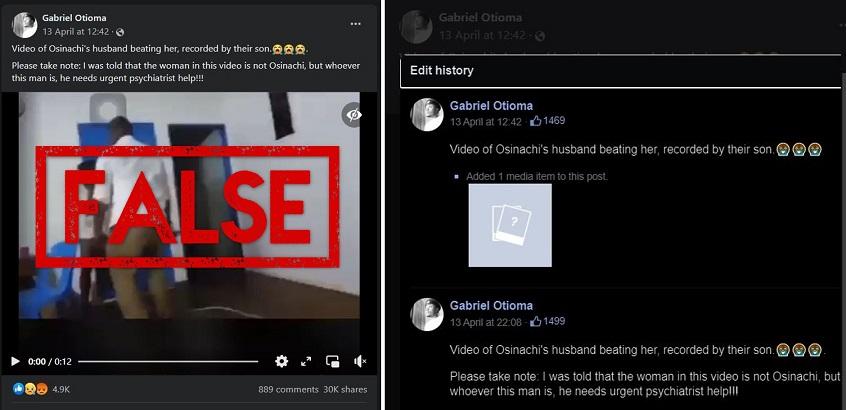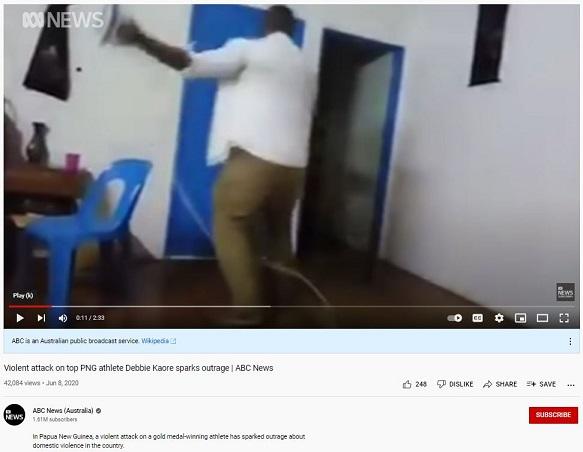
Domestic assault was filmed in Papua New Guinea, unrelated to Nigerian singer’s death in April
- This article is more than three years old.
- Published on April 25, 2022 at 18:55
- 3 min read
- By Segun OLAKOYENIKAN, Monique NGO MAYAG, AFP Nigeria
The claim was published on Facebook on April 13, 2022 — five days after Nwachukwu died in Nigeria’s capital Abuja.
“Video of Osinachi’s husband beating her, recorded by their son,” the original caption in the Facebook post read. The author later edited the note to say the clip did not show the alleged scene after all.
More than a million people have viewed the 12-second video on the social network.

The announcement of Nwachukwu’s death sent shockwaves across Nigeria, sparking strong reactions from the public, including Nigeria’s ex-minister of education Oby Ezekwesili.
The death of Osinachi Nwachukwu of the epic *Ekwueme* worship song really hit hard. To read allegations of spousal abuse worsens the pain.
— Oby Ezekwesili (@obyezeks) April 9, 2022
I hope the truth is unearth and justice given. Everyone, including Churches must take issues of Violence Against Women seriously. Urgently✍ pic.twitter.com/fz50W42EaU
With the cause of death yet to be determined, the post gives the impression the singer was killed by her husband, Peter Nwachukwu — an accusation shared by the gospel star’s colleagues and family, as well as members of the public who claim the late singer was a silent victim of domestic violence.
A petition demanding justice for Nwachukwu has received more than 15,000 signatures.
The claim circulated widely in Nigeria and beyond, including in Ghana. AFP Fact Check debunked French posts shared in Cameroon and Ivory Coast.
But the video seen on Facebook has nothing to do with Nwachukwu or her husband.
Video from Papua New Guinea
By using the video verification tool InVID WeVerify, AFP Fact Check ran a reverse image search on keyframes from the footage and found the same clip published on the website of British newspaper Daily Mail on June 9, 2020.
The story described a savage assault on international women’s rugby league star Debbie Kaore, allegedly by her partner and Papua New Guinea army lieutenant, Murray Oa.
“The champion female athlete is horrifically beaten with a hot iron by her partner,” one of the video’s captions reads.
Daily Mail cited another report published a day earlier by Australia's ABC News, with the harrowing footage uploaded to YouTube on June 8, 2020.

“I am traumatised to have almost lost my life in front of my kids,” Kaore says 27 seconds into the ABC News report.
The story was picked up by other international outlets including the BBC which explained that “the video was posted on TikTok and Instagram by [Kaore's] friend, with permission”.
AFP reported that Kaore allowed the video to be released in the hope “that there won't be another victim after me”.
Oa was jailed for two years in January 2022 over the assault and his appeal efforts were rejected, local media reported.
In 2020, Human Rights Watch said that the country remains one of the most dangerous places in the world to be a woman or a girl. “More than two-thirds of the women in PNG [Papua New Guinea] are victims of domestic violence,” the international non-governmental organisation said.
Nwachukwu autopsy
Media in Nigeria reported that Nwachukwu’s husband was arrested on April 10, 2022, and has remained in police custody pending further investigations into her death.
Nwachukwu was a popular gospel music singer and well known among Christians even in neighbouring countries. Her serious, powerful and melancholy timbre gave a particular colour to her songs, like “Ekwueme”.
She belonged to a church called “Dunamis International Gospel Center” and had four children, according to Nigerian media.
In Nigeria, 36 percent of married women have experienced emotional, sexual or physical violence by their husbands, according to the country's 2018 Demographic and Health Survey (DHS).
Copyright © AFP 2017-2026. Any commercial use of this content requires a subscription. Click here to find out more.
Is there content that you would like AFP to fact-check? Get in touch.
Contact us
